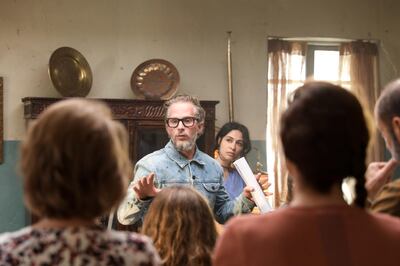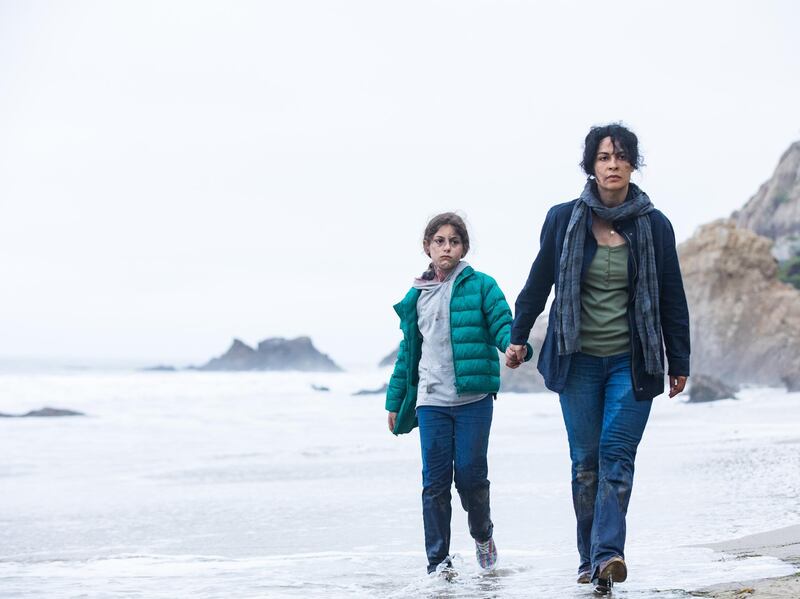When film producer Brandt Andersen was on a plane after visiting refugee camps in Turkey and Greece, he was inspired to catalogue his experiences. "I started writing some stories down of people that I had met with and spoken to," he recalls. By the time he arrived home in LA, he had enough to write a screenplay. "It just sort of came out. It was something that was in my heart and I just kind of needed to put it on paper."
More than that, he has put it on screen. After years of working in Hollywood, producing films as big as Everest, American Made and Silence, Andersen, 42, has made his directorial debut with the 23-minute short Refugee. Last month, this harrowing but hopeful story of a Syrian doctor and her daughter was projected by the artist Banksy on the wall opposite his Bethlehem establishment, The Walled Off Hotel.
Since then, Refugee has been shortlisted by the Academy Awards for Best Live Action Short, with the final Oscar nominations due to be announced next Monday. For a first-time director who isn't even Syrian, and who shot the film entirely in Los Angeles, it's quite an achievement. But there's no question that Refugee is a powerful tale, as Amira (Yasmine Al Massri), a paediatric surgeon in Aleppo, flees the city with her daughter Rasha (Massa Daoud) after tragedy strikes.
Al Massri, the Beirut-raised actress who appeared regularly in US show Quantico, says she was initially sceptical when she met Andersen.
"A big-time producer in Hollywood like him you immediately think, 'Oh, my, what does this guy know about Syria?' Yeah, I walked in with a lot of judgments on him." But as he started telling her his story, she began to think differently. "It was just a beautiful encounter with a human being who really wants to make a difference."
A life-changing experience
Andersen is no tourist in these matters. After a friend raised $20 million (Dh73.4m) for aid after the Haiti earthquake in 2010, he ended up travelling with a posse of doctors to the country to help out. "That experience was just life-changing to me," he says. "After that, it would be wrong not to follow my heart." Every year in the past decade, he has been spending between three to six weeks annually with those forced from their homes by either natural disasters or political oppression.

Once the script for Refugee poured out of him, he was desperate to make every detail authentic, right down to the Aleppan-Syrian accents (many of the cast members were Syrian). "We were trying to be very careful on that," he says, before revealing he had help from Oscar-nominated Lebanese filmmaker Nadine Labaki, who gave Al Massri her start in 2007's Caramel, Labaki's directorial debut set in a beauty salon.
When Andersen was editing Refugee, he asked Al Massri if she thought Labaki might cast an honest eye over his rough cut. "She said 'Let me call her' and generously Nadine watched it and spent several hours on the phone with me. And the first thing that she said to me was 'How were you able to capture the authenticity of the accents?' The way we were able to do it is by having a lot of Syrian actors in the film, who were really making sure [of this], and then Yasmine, who really did her homework."
Andersen finally showed Labaki the finished film at Cairo International Film Festival last November. "We screened it for her privately and she was in tears," he says, having spent the past two months in the Middle East showing the film. "It's interesting because it's received much better acceptance in the Middle East than it has in the West and I don't know why that is … I think they're very appreciative that we tried to be as authentic as we did."
Calling it a “rollercoaster of emotions”, Al Massri was desperate for this level of realism during filming. “I was worried about it when I read the script because you can easily fall into something that’s monotone, that’s boring,” she says. “So I asked Brandt ‘Would you please give me as much truth as possible around me on set?’ And he promised me to do that.” Even in the scene that opens the film, set in a hospital operating theatre, the production team found Al Massri a real human heart to work with.
Opening up a bigger conversation
Since completing Refugee, Andersen hopes to launch a feature-length version of the story, though his priority for the moment is to shepherd the short into the spotlight. "Hopefully, it will help open up a bigger conversation on why this is happening and the personal reasons behind these things," says Andersen, though with such Syria-set documentaries as For Sama and The Cave already making waves on the international film circuit, it seems his short is part of a wider movement right now.
"I think that there is a new cinema that is happening in the world today," says Al Massri, 41. "I don't want to call it refugee art. It's too superficial. [But] there is a new era of storytelling happening. I don't know how to describe it yet. I don't know what the rules are yet, but I know people are hungry to see those stories. And there is a whole community out there that supports it and embraces it and I know that's why I became an actor. And those are the kinds of stories I want to tell as long as I am in this world."
Andersen concurs, noting that his hope for Refugee and other films like it is that it creates a shift in perceptions and attitudes in the West. "If you watch a film like For Sama you can't help but feel moved. And if you feel moved, you're more likely to take action of some sort," he says. "And that action may be as simple as telling other people, but it could also be giving money to a cause that's helping to support refugees, or it could also be providing a level of expertise. Everyone has something that they can provide."
With The Cave and For Sama both shortlisted for the Best Documentary category, there is a strong chance these films will be given even greater exposure come February. "These big events like the Oscars have the biggest amount of viewership," Al Massri says.
“They have big machines supporting them. They have a whole professional network connected to them that know how to produce films and get them to be seen and get them to be talked about. And I think we need this platform as much as this platform needs us.”
Andersen is modest when it comes to the impact of any possible Academy nomination. “My career will happen or not either way!” he chuckles. “But if it shines a better light on the story and things that are going on with these people, then that was what we set out to do.”
In many ways, the creation of Refugee is already a triumph. "Festival or no festival, award or no award … we don't create these movies for recognition," says Al Massri, defiantly. "We create them because that's our only way to survive the world. That's the only way we know how to be."
Nominations for the 92nd Academy Awards will be announced on Monday, January 13






